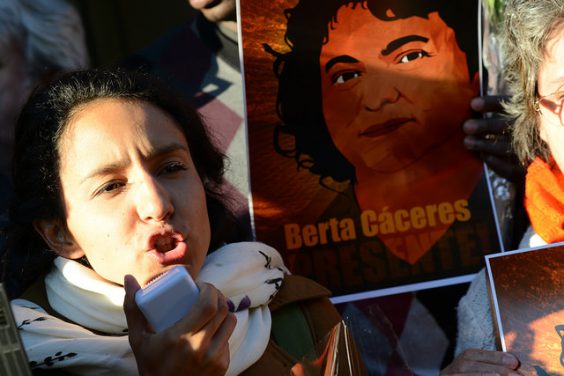The Impact of the Berta Cáceres Human Rights in Honduras Act
by Dina Meza translated by Katherine Wingfield-Dobbs / August 15, 2016 / No comments

A protester after the assassination of Berta Cáceres. Image by Daniel Cima via Flickr.
Honduras faces international consequences imposed by the US Congress for the murder of renowned activist Berta Cáceres and the ongoing violence and state-sponsored repression rampant throughout the country.
Members of the US Congress introduced the “Berta Cáceres Human Rights in Honduras Act” last June with the aim of stopping military and police aid to Honduras – a judgment which must also include the multilateral organizations that provide it with the endorsement of the USA. They cannot grant loans related to this funding while this provision is in place since credit history matters and they have a bad record. The provision will be removed if the Honduran government punishes the perpetrators and masterminds of the crime against Berta Cáceres, the influential activist who was assassinated on March 3, 2016. The Honduran government must also address the hundreds of killings and other abuses committed by the police and the army in Honduras.

- Honduras has one of the world’s highest murder rates. It is also one of the most dangerous countries to practice journalism, ranking 129th out of 180 in the 2014 World Press Freedom Index. Journalists are regularly threatened, attacked, and killed for their work. The Honduran government fails to punish those who use violence against reporters, essentially granting them impunity. This space will be dedicated to examining the lack of protection for Honduran journalists exercising their profession. Topics will include the use of state-sponsored advertising as a mechanism to reward or punish publications, and censorship and self-censorship as hindrances to democratic progress.

- Born in Cofradía, Honduras, Dina Meza has been recognized by PEN International, Amnesty International, Index on Censorship and Reporters without Borders for her work as a journalist and human rights advocate. Currently, Dina is the driving force behind the creation of Honduras PEN Centre. In 2013, she wrote “Reign of Terror,” an in-depth report on threats to Honduran journalists for Index on Censorship’s magazine. In 2014, she was named one of Reporters Without Borders’ “100 Heroes and Heroines of Information.”
After a series of documented arguments in favor of suspending aid to the Honduran police and army, the US Congress indicated that in respect to the crime against Cáceres there were “serious doubts as to the role of the Honduran military in her assassination, including the chain of command within the armed forces, as well as the identity of the true masterminds behind the killing.”
Ebal Díaz, advisor to President Juan Orlando Hernández, pointed out that there is a political game in the introduction of the initiative by the US Parliamentarians and that “we continue to believe that the military should be involved in the security of the country.” Nonetheless, President Hernández was obliged to travel to the country to the north to try to convince people that he is achieving great things in the field of human rights so that they do not withdraw his funding.
This important bill by Congress makes it apparent that the internal media campaign by President Hernández regarding human rights in Honduras and the punishment of those responsible for crimes against human rights defenders has failed outside the country. Honduras is being seen for what it is: a country where the weight of the law is not applied when it comes to the military or the police, who benefit from acquittals.
The human rights situation in Honduras is ever more dangerous for those who defend these fundamental rights, reveals a report by the Inter-American Commission on Human Rights (IACHR), who visited the country last year.
It is very important to note that this climate of risk has a direct relationship with the way in which the justice system in Honduras works, where the operators of justice only work to criminalize the defense of human rights and do not act against those who violate them.
The violent response from the structures of power and the security bodies of the State to protestors demanding their rights stigmatizes and disrespects the work of human rights activists. This stigmatization and disrespect plays a fairly dangerous role when it comes to scenes where there is police and military repression.
I recently experienced such a violent episode against students at the National University who were demanding their right to education. The police arrived to violently evict the young people, who were removed by force with rifles while carrying out a peaceful occupation.
Several human rights defenders arrived when law enforcement officials were trying to launch tear gas in the small space filled with student protestors. When we told the police element to respect human rights, an executing officer sent by a tribunal declared “get these people out of here” and the police attacked the people who were there working for human rights. They pushed us with shields and batons – some people were hit. I crashed against a wall and the aggressiveness was such that I feared something terrible would happen to us.
This is how the police and army work when they bring violent eviction orders – they are deaf to the pleas. In the last few days, this has also happened to several people who defend their legitimate right to circulate freely, as this right is limited by the establishment of tolls in different regions of the country. The people have rebelled against this measure and in exchange have not received a response, just repression.
This scenario is going to become even more acute as social pressures demanding human rights also increase. Besides the proximity of the General Elections in Honduras which will take place in 2017, there are also the re-electionist desires of the current president, Juan Orlando Hernández. There will be repression for some time, more acute than in 2013 General Elections which brought the current president into office despite reports of electoral fraud.
If the Berta Cáceres’ Act were approved by the State of Honduras, in order to bring it to an end they would have to demonstrate that they are truly fighting impunity by punishing the military and the police involved in human rights abuses.
The citizens will keep applying pressure so that their rights are respected, that there is no obstacle to exercising them, and that those who wish to obstruct this work have to suffer the consequences. If fear overcomes us we will lose.




